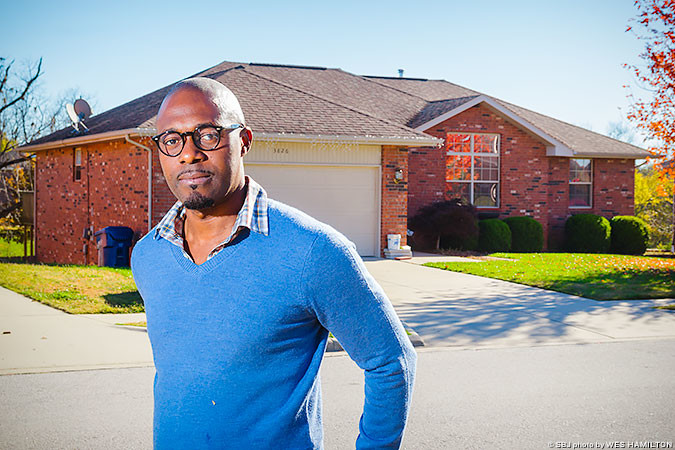YOUR BUSINESS AUTHORITY
Springfield, MO
YOUR BUSINESS AUTHORITY
Springfield, MO

About 20 people, women in colorful dresses and men in suits are engaged in animated discourse in a Springfield living room, eating peanut soup with rice. There is a secret spice box hidden somewhere in the kitchen that helps create the unique flavors of the dish. The language fluidly transitions from French to Pidgin English, to English and back again with clucks and head shakes from the women and outbursts and laughter from the men: This is a meeting of a most unique bank in the Ozarks.
Njangi is the African term for an ancient form of banking that historically takes place after harvest. Joe Ndiba, who moved to the United States from Cameroon 25 years ago, said anywhere there are people from Cameroon, Njangi will be found.
“It’s a system of banking without interest and without the nuances of the modern banking system,” said the account executive with Follett Educational Services Inc. “It’s a culture we all understand. You almost have an allegiance to that group. There’s almost a secret code of honor that we live by.”
He decided to begin a Njangi in the Ozarks. Assuming there are 12 people who want to participate, they come together and plan.
“Let’s say the Njangi is going to be set at $1,000 a month,” he said. “That means that if everyone of us comes in at $1,000, there’s going to be $12,000 on the table.”
They establish the amount and date for each to contribute and if they’ll meet weekly, monthly or quarterly. One participant at each established meeting receives that lump sum.
“The last part of the puzzle is to determine the order of who benefits at what time,” Ndiba said. “That, in the past, has caused a lot of argument. Now what we do is write all the numbers, 1-12 in a basket, and people have to pick their number. That is the order.”
Participants can, and often do, negotiate the order from there.
“There is no doubt that participants will fulfill their obligation. Trust is paramount,” he said. “You have to get to know someone and make sure there isn’t someone who is wishy-washy who will disrupt the whole system.”
Ndiba’s American wife, Hannah, was initially skeptical.
“I said to Joe, ‘Why don’t we just use our savings account?’” she said.
But things come up, and the money isn’t often traditionally saved.
“This is a very common practice and is done all over Africa,” she said. “We started with small amounts to build trust – just $50 a month – and made sure that everybody felt comfortable and trusted each other before we increased to the higher amount.”
The stakes
The group moved incrementally to $100, then $500 and now $1,000. The number of participants typically decrease the higher the investment. Joe Ndiba knows of groups that play with $5,000 and sometimes $10,000 per month.
Njangi is more than a system of banking. It’s social, community, belonging, self-discipline and trust all mixed together.
“Look at how relationship is defined,” Ndiba said. “In different cultures, the relationship is deeper – if I’m in trouble, it is more or less the duty of my community to get me out of that trouble.”
Two years ago, one Njangi allowed the Ndibas to easily pay the $7,000 down payment for their home. Funds generated from their last Njangi covered costs for a water tower and well for Joe Ndiba’s parents in Cameroon.
“We are planning to do one well per year for somebody else in Cameroon,” Ndiba said.
Some buy cars, others buy houses, some start businesses. Ndiba said what people do with the money is their business, and sometimes it isn’t discussed. Many, though, are building houses back in Cameroon.
Like microcredit
Similar concepts are found in India and China. Ndiba believes the concept is foreign to Americans because it stems from collectivist rather than individualistic societies.
James Philpot, associate professor of finance at Missouri State University, said Njangi sounds very much like another form of microcredit.
“In Asia, we’ve seen some successes with microcredit,” he said.
In that scenario, a community gets together and lends money to someone, who usually is borrowing to establish a business. The success of these loans partly is due to a feeling of obligation to family and the community.
“Here in the United States, when we borrow from a bank, we may feel [an] obligation to repay from the perspective of honoring our contracts,” he said. “That’s very important and certainly a cornerstone of American society and American business, but we really don’t have any sort of personal feeling toward the institution.”
Peer pressure, too, is a factor in repayment.
“It’s a considerably different dynamic than just dealing with a bill collector that you don’t know who is calling you from another state,” he said.
While similar in cultural pressures for repayment, Njangi and microloans differ because Njangi does not apply interest. According to the Consultative Group to Assist the Poor, global differences in microcredit interest rates are dramatic. The global average is about 35 percent, but in Uzbekistan it’s 80 percent and in Sri Lanka it’s 17 percent for the typically small loans.
With Njangi, it’s basically friends getting together and creating their own savings account. In the Ndibas’ case, it’s often for community betterment some 6,700 miles across the Atlantic Ocean.
“If we take, say $10,000 today and travel to Cameroon, we could get the foundation and the bricks. Because in Cameroon you don’t just go to the bank and the bank says OK, ‘Here is $170,000 to build your house.’ We do things differently,” Joe Ndiba said. “You build your house by yourself and it could take you years to build it. Njangi can help us do things.”
[[In-content Ad]]
Alair Springfield is first Missouri franchise for Canada-based company.